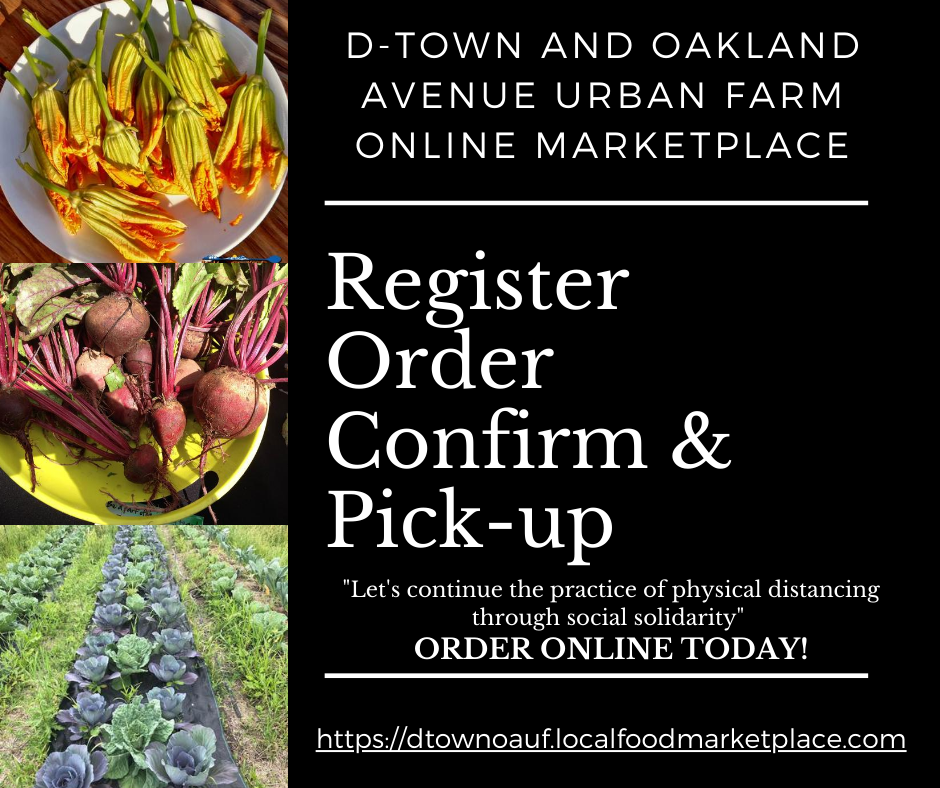Author: Keesa V. Johnson
Date: July 31, 2020
Currently, I’m at the midpoint of my first COVID 19 summer, working as an urban agriculture intern with D-Town Farm and Oakland Avenue Urban Farm in Detroit. Our online system is up and open for business! If you live in the area, visit Detroit often, and care about supporting local black farmers, please place an order from us via our new online ordering system here. As a graduate student in the STAMPS MDes program at the University of Michigan, it’s exhilarating to be able to use my integrative design skills to move from a design student, to a farm intern, UX researcher, social media strategists, and now a community food market administrator. I’m learning quite a bit about online food hubs, online markets and farm stands, accounting, sustainability, and what types of online systems may or may not work within community design. Some of my administrative tasks are facilitating weekly meetings online with producers, while updating their “pick tickets (orders placed online for pacing”, produce availability (what is available for sale that week at each farm), value added products, answering emails and making follow-up calls to our newly registered community members. I’m also in the process of creating short webcasts to teach potential community shoppers how to register and use the system as well as develop social media strategies for the D-Town Farm Stand and the Oakland Avenue Farmers Market to be integrated in their on-going marketing plans.
Before we launched the system, we conducted a rapid prototyping and user testing session with potential community users. One of the design methods that I use within user testing is “learning from extremes.” Learning from extremes is a design technique that gives a more balanced perspective of the system you are building through observing and interviewing a variety of potential users. This allowed me to get a more balanced view of what’s possible as well as help untether me from my assumptions and constraints as a designer. I used a small sample size of the community users, along with a food designer, a catering manager, farm manager, as well as a Stocks trader to make the necessary changes needed before we launched. My findings presented a potential problem, I shared with my community partners that many of the current online ordering systems may not fit the needs of the community we are serving. Based upon research done from the sharing economy technical report, current online shopping technology is designed for the “typically highly educated, affluent, and technical adept”. And it’s true from my system’s analysis of over 8 systems I was looking to use, but it doesn’t have to be this way. Online ordering systems can be built with equity in mind from the beginning to its implementation and it can lead to healthier food choices based upon research conducted by Dr Tawana R. Dillahunt from the University of Michigan UMSI.
I’m also in the midst of learning how farming is a form of resistance, how language and definitions are used as a form of oppression, as I listen deeply to gain wisdom on how self-determining systems are what creates sustainable communities not corporations. As a 21st century designer, there is a great need for me to reframe problems from an asset building perspective and allow my community to guide me in finding their solutions collaboratively. I see the deep necessity of how activists, researchers, and designers can work together to galvanize the many layers and threads of building a community food system that services black and brown people locally and internationally with respect, integrity, and love through the act of sustainment (combined values of the D-Town and Oakland Avenue Online MarketPlace).
Keesa V. Johnson is a Master in integrative design graduate candidate of the University of Michigan Penny Stamps School of Art and Design. She works as the DEI Manager at the UM Campus Farm and is a Food, Justice, and Stem research assistant helping to shape the African Futurist Greenhouse project. Her internship with D-Town Farm and Oakland Avenue Urban Farms in Detroit are in partnership with the Sustainable Food Systems Initiative at University of Michigan.



